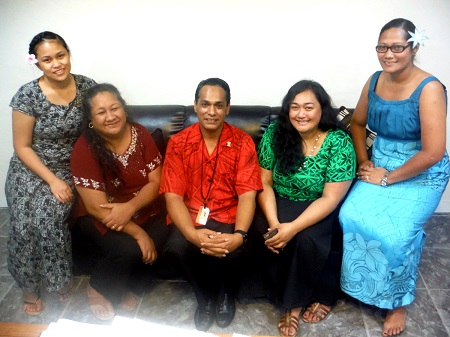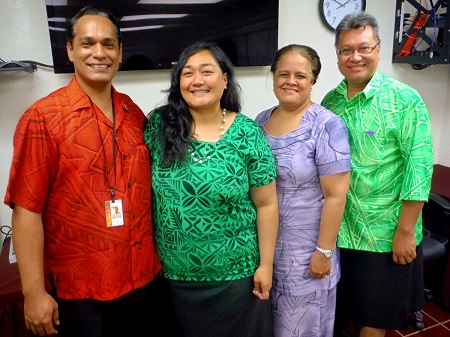
Natashi Autasi Saelua (second right), a PhD candidate at Indiana University, spent her summer working with the ASCC Office of Institutional Effectiveness (IE) as part of her research on the representation of Samoans and Pacific Islanders in higher education. She is seen here with IE staff (l-r) Malelega Ah Kau, Virginia Mailo-Filiga, IE Director Sonny Leomiti, Natasha, and Tanya Lesa Antonio. (Photo: J. Kneubuhl)

Natashi Autasi Saelua (second left), a PhD candidate at Indiana University, spent her summer working with the ASCC Office of Institutional Effectiveness (IE) as part of her research on the representation of Samoans and Pacific Islanders in higher education. She is seen here with (l-r) IE Director Sonny Leomiti, Acting President/Vice President of Academic and Student Affairs Dr. Rosenonnve Makaiwi Pato, and Vice President of Administrative Services Dr. Mikaele Etuale. (Photo: J. Kneubuhl)

Natashi Autasi Saelua (second right), a PhD candidate at Indiana University, spent her summer working with the ASCC Office of Institutional Effectiveness (IE) as part of her research on the representation of Samoans and Pacific Islanders in higher education. She is seen here with IE staff (l-r) Malelega Ah Kau, Virginia Mailo-Filiga, IE Director Sonny Leomiti, Natasha, and Tanya Lesa Antonio. (Photo: J. Kneubuhl)
ASCC Summer Intern Researching Pacific Representation in Higher Education
September 8, 2015
By James Kneubuhl, ASCC Press Officer
The American Samoa Community College (ASCC) regularly employs interns in various capacities, but this summer the College’s Office of Institutional Effectiveness (IE) enjoyed the company of a temporary staff member whose purpose went far beyond simply a summer job. Currently pursuing a PhD at Indiana University, Natasha Autasi Saelua brought with her many years of experience with mainland organizations that offer assistance to Samoans and other Pacific Islanders as they bridge the gap between their cultural background and mainstream college life. Her summer tenure with IE tied in with her long-term goal of, in her words, “producing new knowledge, or new insights, on how college campuses on the continent as well as in the Pacific can better support indigenous students.”
A self-described “military brat” born in the United States to father Savaliolefilemu Maselusi Saelua with roots in Leone, and mother Agnes Ah Kiong Saelua, originally from Tafananai, Natasha traces her own sense of cultural dislocation to childhood years in South Korea, where she lived while Savaliolefilemu was stationed at the Osan Air Force Base. At 13, her family relocated to California, where Natasha completed high school and entered UCLA to seek a BA in History, with a minor in Political Science. Meeting students of her own ethnicity at UCLA , Natasha became part of both the Pacific Islands’ Students Association (PISA) and the Student Initiated Outreach Committee.
“Myself and other Pacific Islander students also organized the Pacific Islander Education & Retention Project (PIER),” she recalled, “an after-school project that seeks to increase access to higher education for Pacific Islanders in Southern California. PIER has provided tutoring and mentoring services to high school and community college students for over 15 years now. It also enables undergrads at UCLA to connect to their Pacific Islander communities, give back to them, and tackle real world problems using the skills they gain from college.” Completing her B.A. in 2001, she continued working as a community advocate for Pacific Islanders, and in 2009, returned to UCLA as an advisor in the Community Programs Office, which focused on student-initiated outreach projects, one of which she had helped create, PIER. “A year after becoming an advisor, I also enrolled in the UCLA Master of Arts program in Asian American Studies,” she recalled, “and my thesis examined how PIER provided Pacific Islander high school students with a safe space for academic pursuit, role models, and a valuable information source on higher education.”
Natasha further collaborated in establishing yet another new advocacy association called Empowering Pacific Islander Communities (EPIC), which today continues to serve the Pacific community in the USA. She graduated from UCLA with her M.A. in 2013, and next began work on a PhD in higher education at the University of Denver, a goal she will continue focusing on after she transitions this year to Indiana University. “I’ll also work as a project associate for the National Survey of Student Engagement (NSSE) this year,” she said, “while continuing my studies on issues of access and opportunity to higher education for Pacific Islander students.”
Before moving to Indiana, Natasha made an extended visit to American Samoa this summer to reconnect with her family. “While here,” she explained, “I wanted to remain productive as a scholar, and also connect with ASCC. For my MA program, I wrote a paper on accreditation as it is applied to Pacific institutions, and presented it at the American Education Research Association Annual Meeting held in Chicago this year. Until then, my thoughts on that issue were purely theoretical, and I knew that I’d never fully understand it without meeting the people working every day to address it. So early in May, I contacted ASCC President Dr. Seth Galea’i about an internship with the campus office leading the accreditation effort, and President Galea’i referred me to Mr. Sonny Leomiti, Director of IE.
While at IE, Natasha worked closely with Mrs. Virginia Mailo-Filiga, Institutional Researcher, and over four weeks she observed ASCC’s approach to assessment, program evaluation, and accreditation. “Mrs. Mailo-Filiga shared her experiences as a researcher,” said Natasha, “and how the administration is addressing the WASC-ACCJC sanctions. I was honored to have been invited as a guest to committee retreats, where I witnessed first-hand how hard the administration, staff and faculty are working to address the accreditation issues.”
Mrs. Mailo-Filiga expressed her appreciation of Natasha’s assistance over the summer. “Her insight and experience from other institutions of higher learning brought new knowledge and skills to our team,” said Mrs. Mailo-Filiga. “We discussed student retention at length, as IE is currently assisting in the effort to build a retention model for the institution. She also participated in our subcommittee workshops to address WASC-ACCJC recommendations. After the workshops, she gave a synopsis of how she views the evaluation of schools in the Pacific by US accreditors, a subject she hopes to delve into further as part of her her doctorate.”
As Natasha’s time at IE concluded earlier this month, she shared some of the vision that the experience inspired. “I try to conceive of what an indigenous approach to postsecondary accreditation would look like,” she reflected, “and whether it might be useful to reframe concepts like benchmarking, quality, standards, and assessment to reflect a holistic understanding of ASCC, taking into account American Samoa's unique social, historical and political history. This summer, I saw that there is cultural capital at ASCC that higher education scholars, practitioners and policy makers in the continent can learn from: that we can rely on our Samoan values of mutuality, collaboration, and collectivism to respond to critical issues/situations.”
For more information on EPIC, co-founded by Natasha Autasi Saelua, visit www.empoweredpi.org.
